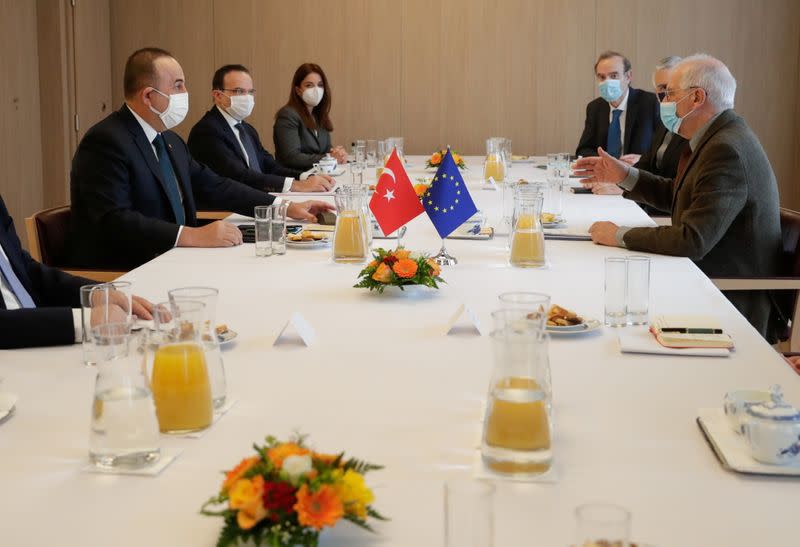By Robin Emmott and Tuvan Gumrukcu
BRUSSELS / ANKARA (Reuters) – The European Union and Turkey pressed each other on Thursday to take concrete steps to improve long-strained relations over disagreements over Ankara’s energy, migration and human rights record.
Turkey, which remains an official candidate for EU membership despite tensions, faces the threat of EU economic sanctions over a hydrocarbon dispute with Greece in the eastern Mediterranean, but the climate between Brussels and Ankara has improved since the year new.
“We have seen an improvement in the general atmosphere,” said EU foreign policy chief Josep Borrell, as he welcomed Turkish Foreign Minister Mevlut Cavusoglu to negotiations, describing 2020 as complicated.
“Intentions and announcements need to be translated into actions,” said Borrell.
NATO Secretary-General Jens Stoltenberg, who will meet Cavusoglu on Friday, also noted “a more positive atmosphere”, telling reporters via video conference that there was “an opportunity to really make some progress in resolving the differences”.
The improved tone follows a videoconference between Turkish President Tayyip Erdogan and the head of the European Commission, Ursula von der Leyen, on January 9, in which both emphasize the importance of bilateral relations.
Cavusoglu said he expected von der Leyen and Charles Michel, the head of the European Council representing the 27 EU member countries, to visit Turkey after an invitation by Erdogan.
“Of course, it is important that there is a positive atmosphere in Turkey-EU relations, but for this to be sustainable, we must take concrete measures,” added Cavusoglu.
STRUCTURED TIES
2020 was particularly difficult for relations between Turkey and the EU, especially France, with Erdogan publicly expressing his hope that protests in French cities would overthrow President Emmanuel Macron.
Greece and Cyprus, strongly supported by France, want to punish Turkey for what they see as provocative exploitation of oil and gas by Turkish ships in disputed waters, but Germany and Italy are reluctant to pursue any sanctions against Ankara.
Turkey has now withdrawn the ships and must restart negotiations with Greece, although the EU has accused Ankara of playing “cat and mouse” in a pattern of provocation and reconciliation.
EU leaders will decide in March whether to impose sanctions.
Brussels also accuses Erdogan of undermining the economy, eroding democracy and destroying independent courts and media, leaving Turkey’s candidacy to join the EU more distant than ever.
“We remain concerned about the (human rights) situation in Turkey,” Borrell said on Thursday.
The European Parliament on Thursday supported a resolution calling for the release of Selahattin Demirtas, a leading Kurdish politician arrested in 2016 on terrorism-related charges.
But Turkey remains a major destination for EU trade and investment and also hosts some 4 million Syrian refugees. The EU intends to reach an agreement on new funds for refugees from 2022 to discourage them from entering the bloc.
Ankara wants progress in the Turkish’s right to travel visa-free to the EU, an update of its trade agreement with Europe and recognition of its hydrocarbon claims on its maritime platform.
(Written by Robin Emmott; Editing by Gareth Jones)
